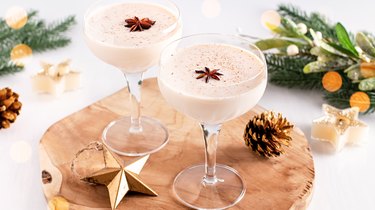
Eggnog is a holiday tradition embraced by many partygoers, especially when liberally laced with the spirit of choice: brandy, bourbon or rum. When you make eggnog, you can adjust the thick, sweet, creamy beverage to suit your own preferences and dietary needs, from a basic drink with a hint of nutmeg to low carb to dairy (but not egg) free. If your homemade eggnog isn't quite right, add beaten egg whites, whipped heavy cream or a nondairy topping to thicken your drink to the perfect consistency.
About Those Eggs
Video of the Day
Though many recipes use uncooked eggs, you should heat the milk and egg mixture to 160 degrees Fahrenheit to kill any salmonella bacteria. Alternatively, you can use pasteurized eggs and egg whites or an egg substitute, though even pasteurized eggs should be heated to 160 degrees just to be safe. Follow all safe food handling procedures, including using hot water and soap or dishwashing liquid to wash your hands, bowls, whisks and other kitchen utensils and surfaces that may have come in contact with uncooked eggs.
Video of the Day
Eggnog – Hot or Cold
Traditionally, eggnog is a spiced, custardy beverage that is served cold. Chill the mixture overnight before serving to help meld the flavors. However, a hot eggnog cocktail is a treat on a cold winter night. The technique follows the usual eggnog recipe of warm milk, eggs, sugar and spices, but instead of putting it into the refrigerator to chill, add the alcohol, fold in whipped egg whites and ladle it into mugs. Add a sprinkling of dried or freshly grated nutmeg to finish this hot treat.
Creamy Holiday Eggnog
The recipes on how to make eggnog are as many as there are cooks, but nearly all use milk or a milk substitute and eggs. A basic eggnog recipe calls for 1 quart of milk, six eggs, 1/4 teaspoon salt, 1/2 cup sugar, 1 teaspoon vanilla, 1 cup whipping or heavy cream and ground or grated nutmeg. You can substitute lactose-free milk, almond and/or coconut milk or a combination of milk and evaporated milk as needed to accommodate allergies or dietary preferences.
Heat 2 cups of milk slowly in a large saucepan; do not allow it to boil. Beat the eggs and salt together and then stir in the sugar. Some recipes call for separating the eggs, setting aside the whites to use later. Slowly pour the hot milk into the egg mixture while stirring constantly and then return it to the pan. Heat it, stirring with a whisk until the mixture thickens and reaches 160 degrees Fahrenheit.
Quickly stir in the remaining 2 cups of milk and vanilla and then let it cool. Set the pan in ice or cold water and stir continuously for 10 minutes. Chill overnight. Before serving, add the alcohol and then whip the egg whites or heavy cream and fold it into the eggnog. Garnish with nutmeg before serving.
Make Eggnog Thicker
If your homemade or store-bought eggnog is a little too thin, beat 1/4 to 1/2 cup of pasteurized egg whites or 1 cup of heavy cream to soft peaks and add it to the pitcher or punch bowl until it thickens sufficiently. Alternatively, thaw a container of frozen nondairy topping and stir some into your almond or coconut milk eggnog before serving to add that extra bit of creamy flavor and finish off your homemade eggnog.